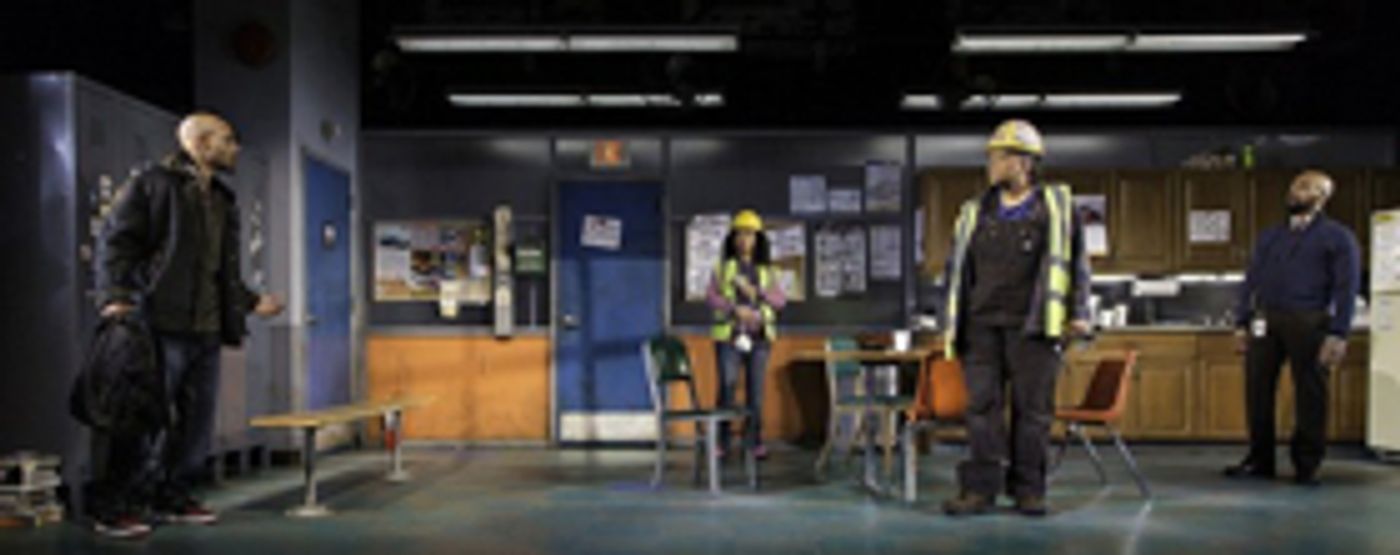Review: SKELETON CREW: 'Survivor: Detroit'

Skeleton Crew
Written by Dominique Morisseau, Directed by Megan Sandberg-Zakian; Scenic Design, Wilson Chin; Costume Design, Ari Fulton; Lighting Design, Adam Honoré; Sound Design, Nathan Leigh; Production Stage Manager, Kevin Schlagle; Stage Manager, Alycia Marucci; Dialect Coach, Cherie Corinne Rice
CAST (in order of appearance): Patricia R. Floyd, Jonathan Louis Dent, Toccarra Cash, Maurice Emmanuel Parent
Performances through March 31 by Huntington Theatre Company at Calderwood Pavilion, Boston Center for the Arts, 527 Tremont Street, Boston, MA; Box Office 617-266-0800 or www.huntingtontheatre.org
Inspired by the Pittsburgh Century Cycle of playwright August Wilson, Dominique Morisseau has penned a trilogy of plays about her hometown of Detroit. Huntington Theatre Company stages the timely final chapter, Skeleton Crew, a powerful drama about the hardships suffered in the Motor City after the 2008 economic recession. Directed with care and great attention to detail by Megan Sandberg-Zakian, the family of workers at an auto plant tries to stand their ground against the inevitable while maintaining their dignity and their connections to one another. As much as the play mourns the demise of an industry and the subsequent loss of livelihood for so many, it also acknowledges and celebrates the resilient people who are the lifeblood of the community.
Skeleton Crew is set in the break room of the small plant where the workers gather before and after their shifts, catching up on each other's lives and soaking up any rumors or news about the feared closing of their facility. The sights and sounds of the assembly line loom over Wilson Chin's industrial set, but the real story lies within the walls of the gathering place where hopes, dreams, and fears are shared. The head and heart of the makeshift family is Faye (Patricia R. Floyd), a fifty-something African-American lesbian grandmother who has been on the line for 29 years. While she is holding on to make it to 30 years, Faye is also the UAW union rep who looks out for everyone's interests by pushing back at management. Having helped him get his first job at the plant, Faye has a lifelong connection to factory foreman Reggie (Maurice Emmanuel Parent), whose late mother was her soul sister. Dez (Jonathan Louis Dent) is the bad boy of the break room, always working a scheme and flirting with Shanita (Toccarra Cash), an expectant single mom and hard worker trying to save up to support her baby.
Thanks to Morisseau's smart writing, the characters are in no way stereotypes, and the actors use their considerable talents to inhabit them in all dimensions. Floyd is a rock in the ensemble, as much as her character serves as the anchor to this little crew. Her no-nonsense earth mother helps to keep everyone on an even keel as they navigate the rough seas of the unknown future, but she harbors more than a few secrets that may jeopardize her situation. Parent is mesmerizing as The Man in the middle, trying to protect the workers who used to be his peers, while fulfilling his obligations to management and his family. The conflict he feels is etched on his face and betrayed by his every movement, culminating in a powerfully emotional denouement. In their scenes together, Floyd and Parent authentically project the depth and breadth of the relationship shared by the two, convincing us of a shared past and their commitment to stand by each other, come what may. Dent moves fluidly through Dez's story arc, ranging from the smooth flirt to the defensive rebel, from dreamer to stand-up guy. Cash becomes increasingly captivating to watch as her character opens up, expressing the pride she feels about her job and accepting the hormonal changes happening to her. Together, Dent and Cash make the chemistry between Dez and Shanita feel organic.
The world of the play, as crafted by the design team, is crucial to convey the tension felt by the workers, and how the unknown weighs on them. Above the walls of the break room, fans whirr and the assembly line moves with car doors suspended from a track; red and blue horizontal lights (design by Adam Honoré) give an eerie glow to the machinery, and the rhythmic sound (design by Nathan Leigh) of the stamping press beats in time to the moving parts. As the downsizing of the plant progresses, pieces of the overhead display recede, disappearing from view. Costume designer Ari Fulton distinguishes between the blue collar workers, with their overalls, blue jeans, and sweatshirts, and the white collar manager wearing a crisp shirt and tie.
Sandberg-Zakian does an excellent job of balancing this world of hardship with the strength and humanity of the people who reside in it. There is nothing false about the way the action unfolds or how the characters respond to each other and the situations they encounter. These are not the kind of people we often see onstage, but their stories are universal and we can learn a lot from their resilience. Each of them has their flaws, but ultimately they accept responsibility for themselves and the members of their community. The system has broken down and the American Dream no longer feels attainable for far too many. However, the members of the Skeleton Crew family are survivors who show that what really matters is taking care of each other.
Photo credit: T. Charles Erickson (Jonathan Louis Dent, Toccarra Cash, Patricia R. Floyd, Maurice Emmanuel Parent)
Reader Reviews
Videos

